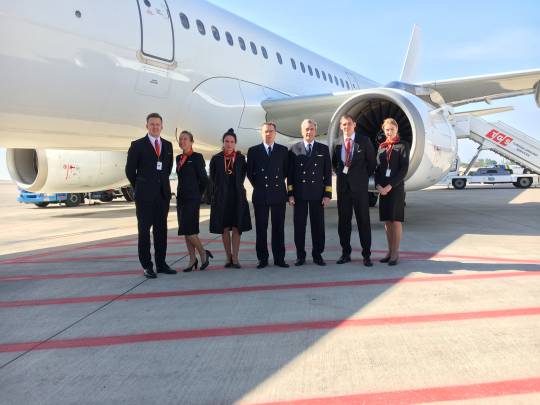

Yury Savenkov: 42 Years in the Sky
09.05.2017Yury Savenkov has made his last flight at SmartLynx Airlines on April 25, right before his official retirement and 65th birthday. He has worked as a pilot since 1975, and has flown on An2, TU 134 and Airbus A320 series aircraft. Now it is time to put his feet on the ground for a change, having flown the total of 22025 block hours – 7788 from which were spent on SmartLynx Airlines.
We threw Yury the traditional farewell of the world of aviation by providing the famous water salute – a water arch through which the plane of the retiring pilot would go after his last flight.
Here is an exclusive interview with Yury Savenkov on his beginnings, family and overall – the life in the sky.
What is it that made you choose the profession of a pilot? Was someone in your family related to the field?
No, no one in my family was a pilot or any other aviation expert. I had always wanted to be a pilot – since I was a child and the first astronauts made their way in to the space. So eventually the dream came true. It was the civil aviation I stepped into in 1973, right after my time spent in the army. I passed all my pilot exams right here in Riga and studied for two years at flight school in Ryazan (Russia). And right after that, I started my flying for Aeroflot in the Spilve airport (Latvia), first as co-pilot, then as pilot and unit commander.
Tell us your work line – with what did it begin and how did you arrive to SmartLynx?
After finishing my studies, I was working in Aeroflot until 1988, and after that it was the Latavio (also Latvijas Aviolīnijas (Latvian Airlines), founded in 1992, after emerging from Aeroflot). In 1995, when the Soviet powers came crashing down, most of the governmental airlines started to go bankrupt. Therefore, I took upon some flying for LatCharter, founded in 1992, as well. It was a part-time job, still maintaining my principal job at Latavio.
Soon enough, Latavio also went down and that was my end of working there. The planes at LatCharter were leased from the banks and soon enough – LatCharter acquired the planes to polish them up and sell further. So, I was the one to fly the sold planes to Moscow and thus I stayed there for 9 years, working in a private airline company on TU-134 series aircraft.
On 2005, when LatCharter started to grow rapidly, I returned to Latvia and started working there. And so, I stayed for over 11 years and I wouldn't have it any other way. My home is here, and the time spent away was only because of necessity.
Would you think that being a pilot is a calling or could anyone do it?
I would rather think it is calling. Because if one is not passionate about it, he would not get through the school – there have been many cases when someone comes to study being a pilot, spends a lot of money in the schooling and then just drops out because it is not his kind of thing. You have to be interested in the field.
How about your family, your kids? Are they following father's footsteps?
I have 3 children and my son wanted to do something related to aviation. It was right when he graduated the Moscow Aviation Institute that he realized he would be following his father's footsteps and become a pilot. He acquired his license in the Czech Republic and hopefully will continue his work in SmartLynx.
22 thousand block hours in the air – how that must feel like?
Honestly, I do not regard it as something unfamiliar, unique. For me – being in the air is my state of mind. I could even say that it is much safer in the air controlling an aircraft than it is on the road steering the wheel of a car.
When you look back at your extensive experience in the field – what would you say is it that you came to realize about the profession?
Well, I certainly learned that in aviation there are always new people coming in, with their own experiences and knowledge. Therefore it makes you to be constantly alert and develop with time. You always have to maintain yourself in a certain level – it sort of helps you to preserve your inner shape.
If we talk about the importance of team – what would you say is the basic factor for maintaining a good team, crew?
Earlier, the crew on a flight was more or less constant unit – we got to know each other very well over years. However, now the flight crew composition changes from flight to flight. So, it is very important to be able to find the contact with different type of people you are working with to maintain a successful cooperation.
What is the advice you would give to young pilots?
The main thing is to learn everything you are taught in the aviation school and follow all the documents. In aviation, especially piloting, there is not much room for the human factor – everything is up to technical knowledge and technology. If you keep that in mind, all will be well.
What are your future plans?
First, I would like to take a short rest. But then I would be happy to share my experience and knowledge continuing my life in aviation differently.
Thank you, dear Yury, and good luck!
ACMI Long-term Partners








